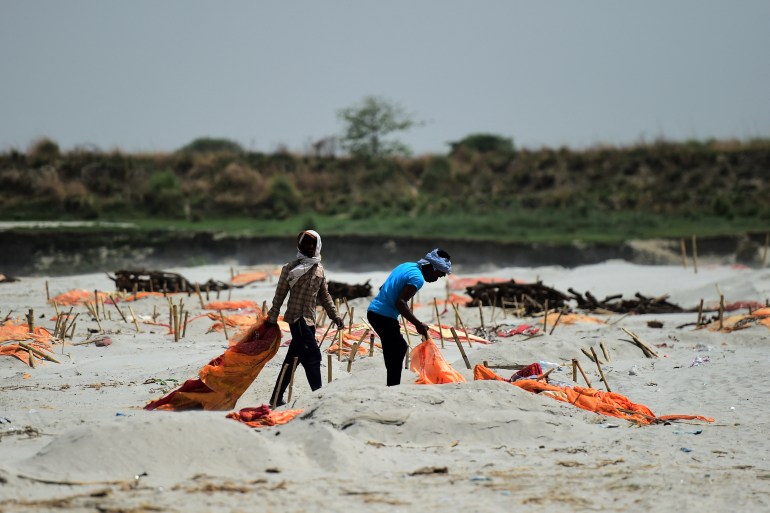At a time when the horrific massacre attributed to the Covid-19 pandemic escalates in Uttar Pradesh, which borders the Ganges River, which lacks health institutions;
Alarms are sounding of the potential for grave risks, while the local government insists the situation is under control.
The French newspaper "La Croix" said that the pandemic - after it spread to the cities - struck rural areas in India, with deaths exceeding 300,000 cases, noting that the authorities in the state of Uttar Pradesh began on Friday, May 21, this year. The identification of "unidentified bodies", following a warning issued on May 10, when villagers saw 71 corpses drifting in the Ganges River from this state into neighboring Bihar.
A local newspaper said that it counted more than two thousand corpses, after it discovered corpses in several other areas, being ravaged by eagles and stray dogs, or floating on the surface of the Holy River after their owners were buried in a hurry on the sandy banks.
Members of the Indian Lucknow Institute of Toxicology Research collect water samples from the Ganges (French)
An epidemic is killing the countryside
Will we ever know how many lives actually lost in India due to the COVID-19 pandemic?
The author of the report wonders, as India relies on its official figures only, and the cumulative number of deaths is estimated at 300 thousand, including 100 thousand last April when the wave of infection hit the health care system in major cities, but the epidemic continues its course in the countryside, where this state recorded Last Saturday, 218 deaths and 5 thousand and 964 new injuries, although experts estimate that the reality will be 5 or 10 times what was recorded.
"The real situation is no longer known, because the virus is spreading in campaigns that lack health institutions, within a country whose strategy is to reduce the number of tests in order to reduce talk of the disaster," said Gilles Verners - a professor of political science at Ashoka University.
A local journalist says that entire villages have spread the virus, without being tested, and that the number of deaths is very high, noting that "except for the countryside of Gorakhpur, Penares and Lucknow, no medical team has visited the villages, contrary to what the authorities claim."
Workers remove fabrics from bodies buried in sand (French)
An illegal cemetery
And the Ganges River - which has come to symbolize the out-of-control ravages of the epidemic - its banks have become an illegal cemetery, because the poor villagers have resorted to an ancient practice of immersing corpses directly in the sacred river, due to the lack of money and wood needed to burn bodies, accelerate deaths and fear of decomposition.
The journalist explained, "The villagers bury the dead on the banks because the police are patrolling the Ganges River," expecting that the monsoons and floods will quickly cover these graves, but bad weather conditions and stray dogs prevented that.
However, Yogi Adityanath - the leader of Uttar Pradesh and a Hindu monk and close to Prime Minister Narendra Modi - reiterates that the situation is "under control" and that "no one has died due to lack of oxygen", despite the sight of disrupted or overcrowded hospitals, even his government She bragged that her crisis management was a "model", and argued that 68% of villages had not seen any cases of the virus.
Officials inspect the burial area of Corona's dead near the cremation site on the banks of the Ganges River in the village of Schringaferbor, about 40 km from the city of Allahabad (French)
Fear reigns
For his part, Jill Verners said that "concealing the numbers of the epidemic is not specific to the state of Uttar Pradesh." The lack of health resources, and as a result fear prevails. "
In the city of Lucknow, for example - as the newspaper says - Invita - a 23-year-old student - closed the WhatsApp group that supports patients, and said, "We were afraid that the government would target us, and we are now working in small and secret groups, without going through social media." .
In this climate, the government is busy with major regional elections next year. Gilles Verners says that "electoral considerations override all other considerations and neglect people," so that at least 1632 teachers have died from the virus after supervising the municipal elections that Yogi Adityanath insisted despite the epidemic.

